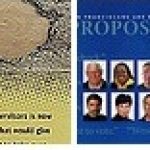  |
|
| See how pro-Proposition N&Q activists are spinning the issue in campaign fliers. |
Propositions N and Q, which would increase and modify San Francisco’s property transfer and payroll expense taxes, were the product of intense negotiations between different business groups.
Not surprisingly, the winners and losers in those negotiations define the pro and con election advertisements.
The laws are simple enough: N would increase the property transfer tax from 0.75 to 1.5 percent on properties worth over $5 million, while Q ensures that partners in law firms have to pay payroll taxes. It also raises the ceiling for payroll tax exemption to $250,000.
The city controller states in the voter handbook that the propositions would raise almost $40 million for the city’s general fund, but how it does that, and who stands to gain or lose, is not so clearcut.
Links to Proposition B
Proponents of the "Close the Loopholes, Yes on N, Yes on Q" campaign argue the issue is simple fairness, i.e., everyone should pay their share.
Opponents say that these are new taxes, that taxes are bad, and that government is inefficient and makes a mess of whatever it touches.
N is similar to a 2002 measure that would have increased the real estate transfer tax by the same amount as N, but covered properties valued at least $1 million; this time around, that figure was raised to $5 million, to win over homeowners.
While N and Q were conceived separately from Proposition B — "Establishing Affordable Housing" — they are now politically, but not legally, linked.
"Affordable Housing" proponents say the passage of N and Q could help fund B, but that contention is a hope at best, not a guarantee.
Because N and Q’s revenues go directly to the general fund; their ability to fund Proposition B is dependent on the size of the general fund deficit and any other demands made on it.
Residential vs. Business
Supporters of N assert many businesses and residents of San Francisco are "struggling with their tax burdens," but that "multinational corporations … evade paying their fair share" as a result of a "loophole" in city tax code.
The measure appeals directly to homeowners by reducing transfer taxes by up to one-third for residential property owners who install solar energy systems or increase earthquake retrofits.
This has proponents going after big companies and big landlords, two popular San Francisco targets, while offering green-friendly and safety-friendly carrots to residential property owners.
The opposition comes from the real estate industry as well as apartment owners who buy and sell apartment and other buildings worth more than $5 million.
They argue both measures are a tax increase, not a modification, say new taxes force up the price of housing in San Francisco, and call the solar and earthquake provisions a "smoke screen."
One argument from the Chinese Real Estate Association of America Inc. claming that San Francisco’s 0.75 percent tax is "one of the highest transfer tax rates in California."
If this is true, then so are Berkeley’s and San Jose’s, at 1.5 and 3.3 percent respectively.
Real Estate Loses Out?
Paid opposition to Proposition N in the voters’ handbook comes from many of the same landlord groups that oppose Proposition B: the San Francisco Apartment Association, the Coalition for Better Housing, the San Francisco Association of Realtors, the Small Property Owners of San Francisco and the Building Owners and Managers Association of San Francisco.
It’s also worth nothing that three large real estate companies bankrolled BOMA’s paid arguments: Cushman & Wakefield, Harsch Investment Properties and Capital and Countries USA, Inc.
There is no organized opposition to Proposition Q, which in addition to making law firm partners pay city payroll taxes, also raises the payroll tax exemption for small businesses from $166,667 to $250,000.
This affects 1,600 small San Francisco businesses and guarantees their vote for the measure.
The only paid argument against Proposition Q is bankrolled by the California Republican Party, Pacific Gas & Electric, and the DGF Y2K Special Trust, a significant contributor to the Republican Party linked to the apparel tycoon Donald G. Fisher of The Gap.
There is limited organized opposition to N and Q because there were negotiations among virtually all parties affected, before final drafts of the propositions were completed.
Increased city taxes on attorney payrolls are offset by a higher ceiling for small business, accounting for the lack of attorney opposition to Q, and the Chamber of Commerce’s neutral stance on it and Proposition N.
In the end, the only group left out in the cold was the real estate industry.<!–• Tune in Crosscurrents on KALW (91.7 FM San Francisco or crossurrentsradio.org) TK TK TK TK . –>
The San Francisco 2008 Election Truthiness Report is co-produced by Newsdesk.org and The Public Press, and funded through small donations using the Spot.Us "crowdfunding" Web site.







